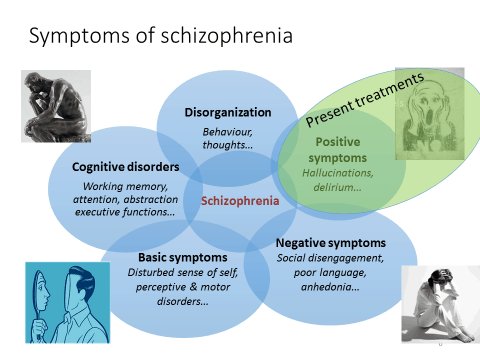

People who experience delusions make more out of a situation than reality would suggest. They’re hearing more than people normally hear.ĭelusions are less sensory than hallucinations, but they still have that “above the baseline” quality. People who hallucinate are seeing more than people normally see. Hallucinations aren’t “good” but they are present over the baseline of normality. How can we call such dreadful symptoms positive? Remember, we’re using the term in the clinical sense, not in its everyday meaning. Similarly, it’s the positive symptoms - the hallucinations and delusions - that first come to mind when we think about schizophrenia.

When we study arithmetic, we learn about the positive or “counting” numbers first because they seem less abstract to most of us. Anything above the line of normality is a positive symptom anything below it is negative. Normal behaviors, moods, cognitions, and attitudes in mental health provide a baseline just as zero provides a baseline in math. In the same way, negative symptoms are less than normal. Being under the baseline doesn’t mean that negative numbers are bad (unless you’re looking at them in your checking account).

Positive numbers are above the baseline of zero negative numbers are below it. When considering whether symptoms are negative or positive, it might be useful to relate them to negative and positive numbers. That’s why being HIV-negative is not a bad thing. That’s something that’s easy to do we’re so used to using the word “negative” in the vernacular, we may automatically think of it as meaning “bad.” That’s not its clinical meaning though.įrom a clinical perspective, negative means “absent” or “lacking.” There’s no connotation of desirability or value. When we study schizophrenia, my students often confuse the negative and positive symptoms of the illness. However, according to clinical experience, when treating negative symptoms, the best effect is achieved by optimizing the dose of medication and by complementing it with psychosocial therapies.From a clinical perspective, “negative” isn’t what you think So far, no treatment appears to substantially improve negative symptoms narrowly defined. Attention should be focused on negative symptoms during the early phase of treatment, because they cause significant impairment to patients’ quality of life. About one in three schizophrenia patients suffer from significant negative symptoms. In these patients, negative symptoms constitute a key element of overall symptoms, weakening their ability to cope with everyday activities, affecting their quality of life and their ability to manage without significant outside help. The studies were manually screened by one of the authors according to the title and abstract.

The search included articles written in English and no time limit was determined. In June 2007, the following databases were searched: Web of Science, PubMed, PsycINFO, Medline (Ovid) and Scopus. The aim of the study was to review the current literature on the negative symptoms of schizophrenia. Severe negative symptoms during the early stages of treatment predict poor prognosis. Their prevalence in first-episode psychosis is high, 50–90%, and 20–40% of schizophrenia patients have persisting negative symptoms. Negative symptoms refer to the weakening or lack of normal thoughts, emotions or behaviour in schizophrenia patients.


 0 kommentar(er)
0 kommentar(er)
